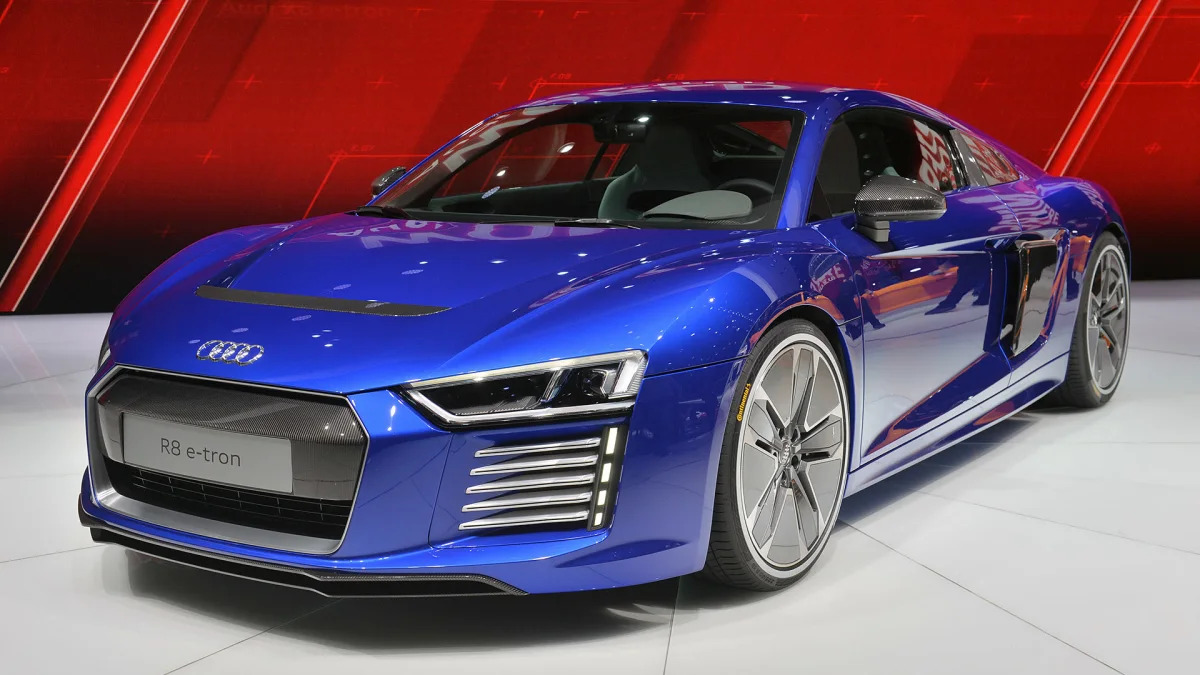Audi's most ambitious - well, most expensive, anyway – electric vehicle is no more. After building fewer than 100 of them (perhaps a lot fewer), Audi has cancelled the R8 E-Tron. Maybe it was the million-dollar-plus price tag. Maybe it was the " supreme hand-built quality." Maybe it was the fact that a non-electric R8 could be had for $164,150. Whatever the reason, was killing the R8 E-Tron a good idea?
But let's stop there. Getting 100 people to plunk down a million dollars or so for a car totals up to be a lot of money. There's no reason for Audi to price the car this high (forerunner vehicle programs almost always lose money for a time, just ask Toyota RE the Prius), but it did. And $100 million (if almost 100 were indeed sold) is nothing to scoff at, is it? It obviously wasn't enough to keep the lines and tooling open for this limited vehicle, and that sort of opens up a bigger question. Does the end (the second end, really) of the R8 E-Tron say something more important about EVs? Are they becoming less exotic high-end fixtures and more everyday transport? In a world full of Bolts and Ioniqs and E-Golfs – so, the world of 2017 and beyond – does a super high-end EV have any meaning? Gas-powered cars have managed to pull this off for decades, with Lamborghinis and Maseratis surviving just fine even with millions of Corollas out there. In a more-developed EV ecosystem, expensive EVs like the R8 should be able to do the same. Just not right now.
Put simply, even with more and more lower-cost, long-range EV on the horizon, Audi could have kept a cache of cool around its battery-powered beast. But it didn't. And we're all a little worse off for it. The EV world is only getting bigger, better, and more bountiful. It needs leaders. Audi has decided it didn't want the R8 E-Tron to try and stake that claim. So someone or something else will.
Related Video:
Here's the case for this being a shortsighted move. As we all know, the VW Group – and Audi especially – is in the middle of an electrification kick, and the R8 E-Tron would have been a good halo vehicle for the brand. Instead, it can stand as a prime example of waffling on the promise of plug-in vehicles. After all, Audi used to be incredibly proud of the R8 E-Tron, even if it had a tough history. The whole program was an on-again/ off-again kind of thing, but with enough momentum to get the EV some time at the Nurburgring. With both Mercedes and the EQ brand and BMW with its i brand moving strong into EVs, letting the headline be "Audi killed an EV" is not exactly fitting. It's not like Audi was wasting time making a lot of these. The R8 E-Tron went on sale in 2015 to customers who made a special request for it, and apparently only 100 did.The R8 E-Tron would have been a good halo vehicle for the brand
But let's stop there. Getting 100 people to plunk down a million dollars or so for a car totals up to be a lot of money. There's no reason for Audi to price the car this high (forerunner vehicle programs almost always lose money for a time, just ask Toyota RE the Prius), but it did. And $100 million (if almost 100 were indeed sold) is nothing to scoff at, is it? It obviously wasn't enough to keep the lines and tooling open for this limited vehicle, and that sort of opens up a bigger question. Does the end (the second end, really) of the R8 E-Tron say something more important about EVs? Are they becoming less exotic high-end fixtures and more everyday transport? In a world full of Bolts and Ioniqs and E-Golfs – so, the world of 2017 and beyond – does a super high-end EV have any meaning? Gas-powered cars have managed to pull this off for decades, with Lamborghinis and Maseratis surviving just fine even with millions of Corollas out there. In a more-developed EV ecosystem, expensive EVs like the R8 should be able to do the same. Just not right now.
It would be irresponsible to try and analyze the EV universe and not mention Tesla. After all, the Californian automaker has almost nothing but halo cars, and it has certainly alerted the world that EVs can be desirable. Audi could have done the same by pushing harder to make the R8 E-Tron the exclusive electric option. It had the looks and the power and the branding, but somehow that wasn't enough. It's not like rich people aren't willing to spend money for their green toys. Fisker was able to sell a number of celebrities its Karma PHEV based on looks and advanced tech, even if the cars themselves left something to be desired. Even with the Model 3 coming soon-ish, Tesla is still selling the pricey Model X - more than ever, in fact.Tesla has almost nothing but halo cars
Put simply, even with more and more lower-cost, long-range EV on the horizon, Audi could have kept a cache of cool around its battery-powered beast. But it didn't. And we're all a little worse off for it. The EV world is only getting bigger, better, and more bountiful. It needs leaders. Audi has decided it didn't want the R8 E-Tron to try and stake that claim. So someone or something else will.
Related Video:










Sign in to post
Please sign in to leave a comment.
Continue